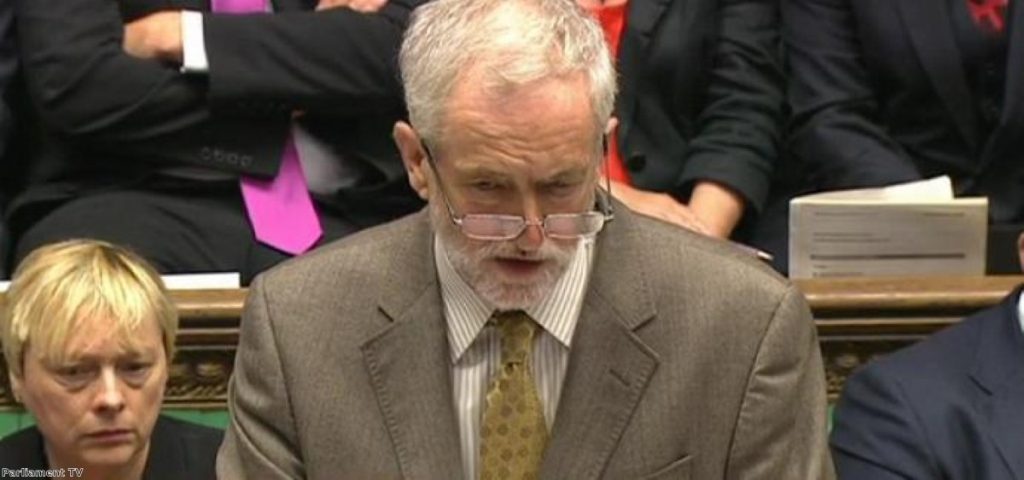I honestly couldn’t work out what one of Jeremy Corbyn’s questions was about today. It wound its way through several issues, followed a few country lanes, stared up at the sky for a while, turned back towards a central avenue, then came to a trundling stop in a cul-de-sac. I’m honestly not sure there was a question there at all, it seemed to be more of a statement, like one of those five minute mini-speeches someone in the audience gives at the end of a panel discussion.
Today’s PMQs session saw the Labour leader cover David Attenborough (he’s a fan), agency workers in the EU (deserve more protection), the living wage (would be a fan if it wasn’t corrupted), offshore trusts (not a fan) and the child refugees (wants to help). To say he didn’t land a hit on any of them is the least of it. It was genuinely unclear which one he was talking about at any given moment. Questions started on one then drifted to another before fizzling out on a third. It required real mental effort to maintain concentration all the way through, and even then there was no guarantee you’d be able to figure out what he was asking.
What was he actually trying to achieve when he walked into the Commons today? It’s not clear. Did he expect any of it to cut through? On a generous reading he was trying to placate EU supporters in his party with support for continental regulations on workers’ rights. But that really is a generous reading and a grasping one.
Cameron – who is not some sort of political genius, but instead a crudely evasive and duplicitous prime minister – played with him like a cat plays with a mouse. At one point Corbyn described the Tories living wage as a "corruption" of the concept, presumably because it does not take into account other payments like tax credits and is not therefore based on the methodology originally envisaged by campaigners. Corbyn happens to be right about that, but it doesn’t matter. Cameron knows how to profit from words like that. He was soon up demanding the Labour leader apologise for calling it corrupt to want to raise low-income workers’ wages.


Is it fair? No. It is irritating and childish. But it is standard politics and if you can’t deal with it, you won’t be able to get out from under it. Instead, Corbyn became angry, waving his hands around and saying of course he supported wage rises. He let his emotions take over and he responded defensively in precisely the way Cameron wanted.
Covering such a spread of topics means it’s hard to pin down the prime minister on any one of them. It never works. The leader of the opposition should cover two issues at the very most – and even that is sub-optimal. Effective PMQs sessions nearly always focus on one topic.
The length of Corbyn’s questions is also a problem and not just for the journos trying to follow along. It means Cameron can just pick whichever part is easiest for him to answer. Corbyn winds through three or four aspects of an issue as he goes and then the PM picks the one most useful to him.
It’s such a waste. There were any number of questions which urgently needed to be asked of Cameron, not least the two PMQs sessions he used to recite attacks on Sadiq Khan which have now been widely accepted as Islamophobic. Cameron hasn’t even bothered to call the new London mayor to congratulate him for his victory. This has been arguably the lead politics news story in the world for the last week and the prime minister is on the wrong side of it. Corbyn did not think it worth mentioning. Lib Dem leader Tim Farron did and got a dismissive answer which he had no opportunity to respond to. Corbyn could have used his follow-up questions for such an opportunity, but they were lost in that country lane, looking up at the sky.
Here's that clip: SNP's @AngusRobertson asks Cameron about #toryelectionfraud. Great question pic.twitter.com/7g22bG5cli
— Sunny Hundal (@sunny_hundal) May 11, 2016
Later on, SNP Westminster leader Angus Roberston got up and asked sharp, succinct questions designed to maximise the discomfort of the prime minister. He linked corruption to Tory election allegations, mixing together Cameron’s gaffe yesterday with a long-running source of anger against government inaction and then closing with a weaponised question about the investigations into Conservative electoral fraud. That’s how you do it.
Once again Robertson stepped in as unofficial leader of the opposition. Someone has to do it. Corbyn is absent and the prime minister needs to be held to account by somebody.

